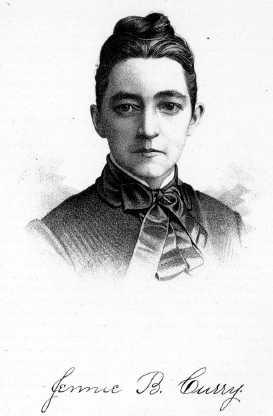1862 responded to a call for troops
from the Governor of Nebraska, reporting for
enrollment at Syracuse. Later, finding the need of men
at home, the Governor's call was rescinded, and Mr.
Bassett remained at home with others in case of being
called upon to protect their own State against the
ravages of the Indians. These in the fall of 1864 came
with, threatening aspect, having on their war paint,
as far as Little Blue, causing the people to leave
their homes and hasten to a place of refuge. They
finally went back across the Missouri River, but in
the meantime the settlers in that region, one Sunday
at church, appointed a committee to send out scouts
and investigate as to the truth of the reports of
danger which were coming to their ears day by day. Mr.
Bassett was one of three men appointed to reconnoiter,
and with the two others started out one Sunday night
on horseback, reaching Beatrice the night following.
They found the people of Little Blue suffering from
the various outrages committed by the redskins, who
had stolen their stock and committed various other
depredations. They had, however, apparently done all
they had dared to do and were now on the retreat, so
the scouting party returned home.
Mr. Bassett now began farming in
earnest upon his land, tilling the soil, setting out
fruit and shade trees, putting up buildings, and
effecting the other improvements naturally suggested
to the enterprising and progressive agriculturist. He
has now a fine orchard of 200 bearing apple trees, a
commodious farmhouse, with barns, sheds and machinery,
live stock, and all the other appliances of the
complete rural home. His land is finely watered by
running streams, and he has plenty of timber. A stone
quarry furnishes all this material desired for use on
the farm, and many loads annually are supplied to the
people generally of this locality.
Mr. Bassett was married first in
Danville, N. Y., in 1856, to Miss Elizabeth Phelps,
who was born in Allegany County, that State, and is
the daughter of Thomas Phelps. His present wife was
Miss Margaretta L. Kerr, to whom he was married Dec.
31, 1872, in Johnson County, Neb. This lady was born
in 1839, in Richland County, Ohio, and is the daughter
of David and Elizabeth Snyder. Her parents were
natives respectively of Beaver and Carlisle Counties,
Pa., and the father a farmer by occupation. Miss
Snyder was first married to Clark Howland, in Ohio.
Mr. H. was born in New York State in 1837, and died in
Sterling, Johnson Co., Neb., in the winter of 1870.
Mrs. Bassett received a good education and taught
school several terms when a young woman. Of her union
with our subject there are two children, Lois and
Cyrus Rolla, who continue at home with their parents.
Mr. and Mrs. B. are members in good standing of the
Methodist Episcopal Church at Rockford, in which our
subject has officiated as Class-Leader and
Superintendent of the Sunday-school. Politically, he
is a Republican with prohibition tendencies. He was at
one time a member of Rockford Grange, P. of H. He has
served as Justice of the Peace in South Branch
Precinct for a period of ten or twelve years, and has
almost continuously been a member of the School Board.

 OHN
P. BROWN, contractor and builder, and doing a good
business in Nebraska City and vicinity, is a man of
much intelligence and general information, and one who
has seen considerable of life in the Great West. An
ardent lover of nature, he, during his younger years,
traveled over a considerable portion of the Western
country, meeting with many adventures among Indians
and the pioneer white element, and learning largely of
life and its various phases, being a keen observer,
and keeping his eyes open to what was going on around
him. OHN
P. BROWN, contractor and builder, and doing a good
business in Nebraska City and vicinity, is a man of
much intelligence and general information, and one who
has seen considerable of life in the Great West. An
ardent lover of nature, he, during his younger years,
traveled over a considerable portion of the Western
country, meeting with many adventures among Indians
and the pioneer white element, and learning largely of
life and its various phases, being a keen observer,
and keeping his eyes open to what was going on around
him.
Mr. Brown struck the eastern line of
this county as early as 1857, coming to Nebraska City
from Davenport, Iowa. A native of Pennsylvania, he was
born in the town of Carlisle, Cumberland County, Feb.
14, 1829, and is the son of Thomas and Margaret
(Phillips) Brown, who were natives of the same county
as their son, where also the paternal grandfather,
Thomas Brown, was born. The father was a shoemaker by
trade, which he followed in his native State during
the early part of his life, but migrated West in May,
1857, and spent his last days in Nebraska City, dying
at the age of sixty-three years. The family first
settled in Nemaha
|


